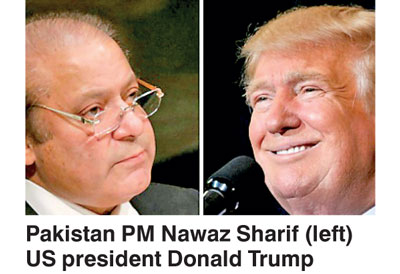Sunday Feb 22, 2026
Sunday Feb 22, 2026
Friday, 2 December 2016 00:11 - - {{hitsCtrl.values.hits}}
 Reuters: US president-elect Donald Trump offered to help solve Pakistan’s problems and praised Prime Minister Nawaz Sharif as a “terrific guy” in the first call between the two men, the Pakistani Leader’s office said.
Reuters: US president-elect Donald Trump offered to help solve Pakistan’s problems and praised Prime Minister Nawaz Sharif as a “terrific guy” in the first call between the two men, the Pakistani Leader’s office said.
Historical allies in the region, Islamabad and Washington have seen relations sour in recent years over US accusations that Pakistan shelters Islamist militants, a charge denied by the South Asian nation.
Sharif’s office said late on Wednesday the Pakistani Premier called Trump to congratulate him on his victory and issued a read out of the call.
Trump’s team confirmed the two men talked and issued a brief statement.
‘President Trump said “Prime Minister Nawaz Sharif you have a very good reputation. You are a terrific guy. You are doing amazing work which is visible in every way,”’ said the statement issued by Sharif’s office.
“I am ready and willing to play any role that you want me to play to address and find solutions to the outstanding problems. It will be an honour and I will personally do it.”
The Prime Minister’s office did not elaborate on the kind of problems Trump offered to solve. The statement also did not clarify why exactly Trump was impressed with Sharif.
Pakistan’s sputtering economy has rebounded since Sharif was elected in 2013 and security has vastly improved amid greater efforts by the army to tackle militants such as the Pakistani Taliban.
But security remains a problem as Islamist groups continue to stage mass attacks and Islamic State radicals have sought to gain a foothold inside Pakistan, claiming responsibility for several high-profile attacks. The economy is also facing acute challenges, including energy shortages.
Trump’s office said the two leaders had a “productive conversation about how the United States and Pakistan will have a strong working relationship in the future”.
‘President-elect Trump also noted that he is looking forward to a lasting and strong personal relationship with Prime Minister Sharif,’ the statement added.
Detailing the conversation, Sharif’s office added that Trump told the Pakistani Premier to feel free to call him any time before he assumes office on 20 January.
“As I am talking to you Prime Minister, I feel I am talking to a person I have known for long,” the statement added, paraphrasing Trump’s comments.
Sharif’s office often releases read outs of his conversations with foreign heads of state but they are seldom so full of praise for the Pakistani Premier, especially during calls with Western leaders.
Sharif invited Trump to visit Pakistan, according to the statement, and the incoming US Leader agreed.
“Mr. Trump said that he would love to come to a fantastic country, fantastic place of fantastic people. Please convey to the Pakistani people that they are amazing and all Pakistanis I have known are exceptional people,” said the statement.
Few details are known about Trump’s planned policy for South Asia but the warm words between the leaders suggests ties could be reset under Trump’s presidency and will ease concerns in Islamabad that Trump’s anti-Muslim rhetoric in the run up to the poll will not lead to unfriendly policies towards Pakistan.
At one point Trump proposed banning Muslims from the entering the United States, remarks that alarmed the predominantly Muslim nation of 190 million people.
Islamabad has also been concerned about warmer ties between the United States and India, fearful that Washington is pivoting towards New Delhi at a time of heightened tensions between the nuclear armed neighbours who have fought three wars since their independence from British rule in 1947.
Trump also has business ties in India, which has stoked concerns in Pakistan that under his presidency the United States may accelerate its shift towards New Delhi.
Pakistan continues to receive aid as well as military funding and training from the United States, but the US Congress has recently held back some help due to frustrations about Pakistan’s unwillingness to act against elements of the Afghan Taliban.
Relations hit new lows in May when a US drone killed Mullah Akhtar Mansour, the leader of the Afghan Taliban movement, on Pakistani territory.